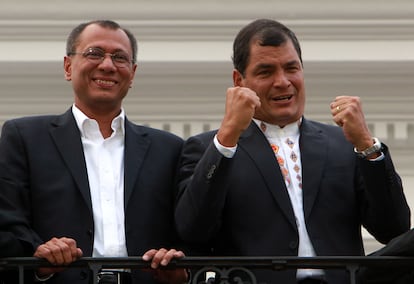Ecuador ex-president Rafael Correa and deputy banned from entering US over corruption cases
The State Department accuses Correa and Jorge Glas of accepting bribes during their tenures as public officials. He says it could be retaliation over a recent photograph with Julian Assange in Strasbourg

The U.S. State Department has banned Rafael Correa, a former president of Ecuador (2007-2017), and his deputy, Jorge Glas, from entering American territory “due to their involvement in significant corruption during their time in public office,” according to an official statement. The Biden administration maintains that both men abused their positions by accepting bribes, including through political contributions, in exchange for awarding favorable government contracts.
The United States has designated former president Correa and Glas, who served as vice-president from 2013 to 2018, as ineligible for visas and entry into the country under Section 7031(c) of the Department of State, Foreign Operations, and Related Programs Appropriations Act, which applies to individuals with direct or indirect involvement in significant corruption or serious human rights violations, the State Department statement said. This measure also affects their immediate family members, including spouses and adult children.
“Human evil… They ignore the fact that no one in the WORLD has accepted the sentence for ‘psychic influence’ and that five countries have granted political asylum to those involved in the Caso Sobornos,” Rafael Correa reacted on the social network X, alluding to a controversial trial in Ecuador that tried him in absentia (he has been living in exile in Belgium since 2017) and found him guilty of aggravated passive bribery. “They even involved my family. It is not right!” he added.
According to Sonia Vera, lawyer for both Correa and Glas, the former president has not requested entry into the United States, and Jorge Glas has been confined in the maximum security prison of La Roca since April 5, when, in an unprecedented event, President Daniel Noboa ordered an assault on the Mexican Embassy in Quito, where Glas was a political asylum seeker. The incursion by Ecuadorian police into the diplomatic building caused a break in relations between both countries, and its outcome will be decided in the International Court of Justice in The Hague, where the Mexican government filed a legal challenge against Ecuador.
In another message on X, Correa alluded to theories about this decision by the United States. The former president believes that it could amount to retaliation for a photograph he posted on October 2, in which he is seen with Julian Assange in Strasbourg, France, during the Parliamentary Assembly of the Council of Europe (PACE), which approved a resolution declaring Assange a “political prisoner.”
Correa also argues that the Biden administration’s decision comes at a critical time for Ecuador, which has endured 10 hours of blackouts due to the country’s poor handling of the energy crisis that has been dragging on since last year, in addition to the escalation of violence that is not under control despite the various states of emergency declared by the President Noboa. “It is a distraction to divert attention from the disaster of the Noboa government,” he said.
Rafael Correa was convicted in April 2020 as the leader of a bribery network. The National Court of Justice, the country’s highest ordinary court, sentenced the former president and 17 members of his government to eight years in prison and barred them from public office for another 25 years for aggravated bribery. The court determined that the former president obtained resources from private companies to fund the campaign of his party, Alianza País, in exchange for offering them government contracts. Correa was president between 2007 and 2017; after leaving power, he was sentenced in absentia and has since lived in exile in Belgium.
One of the other defendants in the case was his former vice president Jorge Glas, who was already serving a six-year sentence for the Odebrecht bribes case and is in prison. Also involved are his former legal secretary to the Presidency, Alexis Mera, and his former ministers María de los Ángeles Duarte, who was taking refuge in the Argentine Embassy in Quito until she fled in a secret operation in 2023, Walter Solís and Vinicio Alvarado, as well as former assembly members Viviana Bonilla and Christian Viteri, currently under protection in Mexico. Of those who were convicted, 10 are entrepreneurs.
Sign up for our weekly newsletter to get more English-language news coverage from EL PAÍS USA Edition
Tu suscripción se está usando en otro dispositivo
¿Quieres añadir otro usuario a tu suscripción?
Si continúas leyendo en este dispositivo, no se podrá leer en el otro.
FlechaTu suscripción se está usando en otro dispositivo y solo puedes acceder a EL PAÍS desde un dispositivo a la vez.
Si quieres compartir tu cuenta, cambia tu suscripción a la modalidad Premium, así podrás añadir otro usuario. Cada uno accederá con su propia cuenta de email, lo que os permitirá personalizar vuestra experiencia en EL PAÍS.
¿Tienes una suscripción de empresa? Accede aquí para contratar más cuentas.
En el caso de no saber quién está usando tu cuenta, te recomendamos cambiar tu contraseña aquí.
Si decides continuar compartiendo tu cuenta, este mensaje se mostrará en tu dispositivo y en el de la otra persona que está usando tu cuenta de forma indefinida, afectando a tu experiencia de lectura. Puedes consultar aquí los términos y condiciones de la suscripción digital.








































